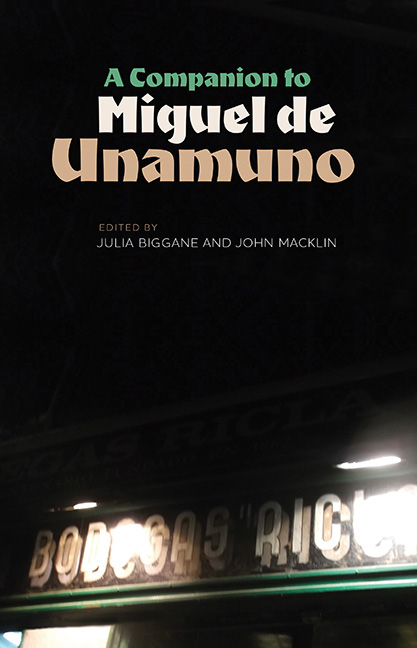Foreword
Published online by Cambridge University Press: 21 May 2021
Summary
This Companion offers a survey of the enormous body of work produced by Miguel de Unamuno (1864-1936) in various genres over the course of almost half a century, from the 1890s to the eve of the Spanish Civil War. No singlevolume study could hope to be exhaustive in its study of such a prolific writer, yet at the same time, because Unamuno's work explored fairly constantly certain themes and certain fundamental questions about existence and identity (both individual and national) over many years, the risk of repetition in tracing its trajectory is always present. This Companion attempts to address both challenges by dividing its study of Unamuno's work into two parts: the first charts Unamuno's work chronologically, analysing major developments and turning points or breaks as well as continuities; the second part studies selected central themes and preoccupations in his writing.
Because Unamuno's fundamental concerns were examined across a range of media, the second part of the volume mostly eschews a genre-based approach, focusing instead on a different key aspect of Unamuno's thought or creative practice across a range of his works. Sandro Borzoni examines Unamuno's existentialism and his complex views on religious faith; C. Alex Longhurst explores Unamuno's linguistic philosophy, and his views on language and its relation both to community and to the individual self; Alison Sinclair focuses on the ethical dimensions of Unamuno's work; Gareth Wood examines the painfully intertwined ontology of self and other in Unamuno's fiction and drama; Julia Biggane's chapter analyses the changing representation of gender and sexuality in his work during a period of important social change in Spain and beyond; J.A.G Garrido Ardila and Julia Biggane's chapter focuses on the enduring intertextual engagement with Don Quixote in Unamuno's essays, fiction and drama. Dividing the volume into two parts in this way aims to help the reader acquire a more comprehensive and substantial sense of the fundamental continuities and changes in Unamuno's thought and creative work than a purely chronological, or genre-based approach would allow. The only exception to this approach is the final chapter, in which Ramón Llorens focuses on Unamuno's travel writing—a much neglected aspect of Unamuno's oeuvre.
- Type
- Chapter
- Information
- A Companion to Miguel de Unamuno , pp. x - xiiPublisher: Boydell & BrewerPrint publication year: 2016



